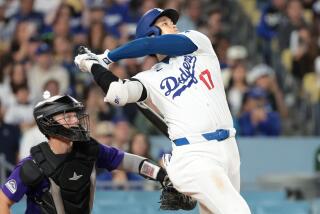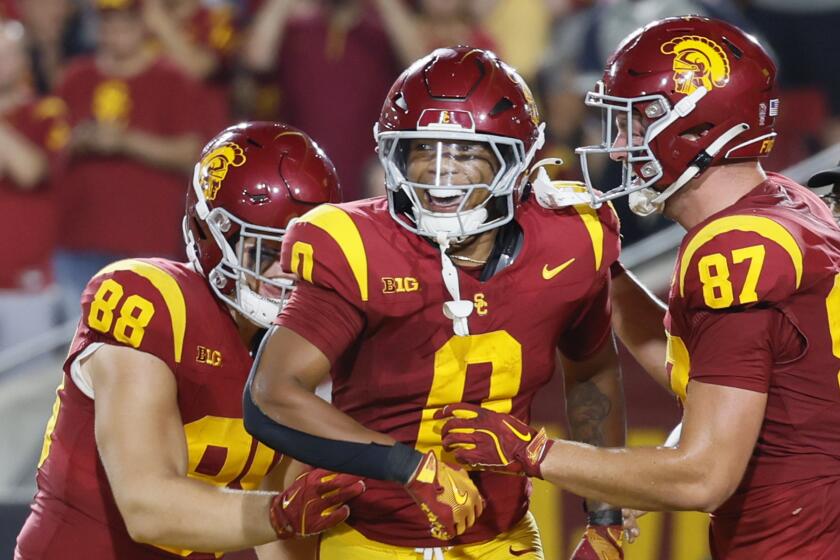Supreme Court to weigh NFL and antitrust laws
The NFL players, like football fans everywhere, will be focused on the playoffs this month and the fierce competition for a spot in the Super Bowl. Their lawyers, however, will be keeping an eye on the Supreme Court.
On Jan. 13, the pro football owners will be asking the high court to rule for the first time that the NFL is shielded from antitrust laws because, while its teams compete on the playing field, they function in business as a “single entity.”
If the justices were to agree, the ramifications could be significant, not just for football but all pro sports leagues, say experts in sports law. Freed from the antitrust laws, owners could get together to restrict salaries for players and coaches and raise prices for everything from tickets to stocking caps.
“For the NFL, this case is like buying a lottery ticket. If they win, it’s a huge victory, with the potential to be incredibly significant,” said Gabe Feldman, who teaches sports law at Tulane University. “If not, they don’t lose much.”
Sports leagues have long confounded antitrust law because they involve both competition and collaboration. The National Football League is made up of 32 independently owned teams that not only compete on the field, but also compete off the field for players, coaches and the loyalty of fans.
But at the Supreme Court, the owners speak of the NFL as a “single unit.” It “exists to produce collectively an entertainment product that no member club could produce on its own,” they say.
For much of the NFL’s history, the owners controlled the players and kept salaries low. In the early 1990s, however, the players used an antitrust suit to win the right to sell their services as “free agents.” This agreement expires in 2011, say lawyers for the players union, along with labor agreements in Major League Baseball, the National Basketball Assn. and the National Hockey League.
Lawyers for the players in the four sports say they fear the Supreme Court case could be the first step toward shifting power back to the owners.
“The owners’ appeal in this case is a Trojan horse designed to free sports owners so they can act without fear of the antitrust laws,” says Jeffrey Kessler, a New York lawyer who filed the brief on behalf of the players in football, baseball, basketball and hockey. A big win for the owners “would mean more work stoppages” by the players and their unions, he said.
Lawyers for the NFL declined to comment, although they noted that their legal arguments focus on the marketing and promoting of pro football, not the salaries of players.
The case before the high court began when the NFL gave Reebok an exclusive license to sell hats and caps with the logos of NFL teams. Until then, American Needle Inc., a maker of sportswear in the Chicago suburb of Buffalo Grove, had sold hats and caps with various team logos.
Shut out of the market, American Needle sued the NFL, contending that the league’s licensing deal violated the Sherman Act, which forbids any “contract, combination or conspiracy in restraint of trade.” Its lawyers said consumers were being charged monopoly prices. They quoted a Reebok executive saying “basic fitted caps that were selling for $19.99 a few years ago were now selling for $30.”
But a federal judge and the U.S. 7th Circuit Court of Appeals in Chicago ruled for the NFL, saying the league acted as “a single entity,” at least when promoting its product.
American Needle appealed to the Supreme Court last year. In a highly unusual move, the NFL urged the justices to hear the appeal, even though the league had prevailed.
“This is like scoring a touchdown and then asking the officials to review the replay,” Feldman said.
In its appeal, the NFL asked the justices to rule broadly that a pro sports league can be “deemed a single entity” and is thereby immune from the antitrust laws “with respect to core venture functions.” This should include matters such as “where to locate its clubs” and “the terms and conditions of player employment,” the league’s lawyers said.
That comment set off alarms among the players. Their worries grew in late June, when the Supreme Court announced it would hear the case.
The world of sports law has been talking about whether the justices may be about to protect the owners from all manner of lawsuits. In recent years, the court has consistently cut back on the reach of antitrust laws. But many others predict the court is likely to rule narrowly on the licensing dispute.
Even so, the decision could have an impact on the marketing of pro sports.
“There is an astonishing amount of money at stake,” says Northwestern University law professor James Speta. “Sports are important to the economy and the culture, and this case could put more power in the hands of the leagues to raise prices for consumers.”
More to Read
Go beyond the scoreboard
Get the latest on L.A.'s teams in the daily Sports Report newsletter.
You may occasionally receive promotional content from the Los Angeles Times.











